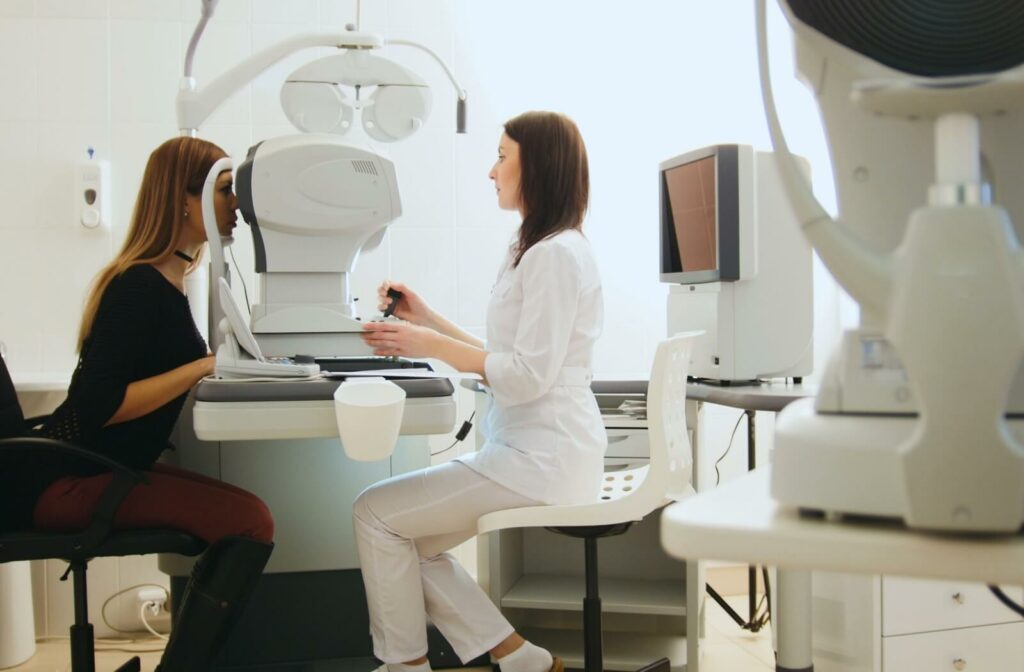Glaucoma, often called the “silent thief of sight,” can be deeply connected to family history. If someone in your family has it, your own risk might be higher. While genetics play a key role, factors like age and lifestyle can also influence your chances.
Knowing your family’s eye health history and staying proactive with regular eye checkups are essential steps to protecting your vision.
What Is Glaucoma?
Glaucoma is a group of eye disorders that damage the optic nerve, which is essential for healthy vision. This optic nerve damage is often associated with high pressure inside the eye (intraocular pressure), though glaucoma can still occur even with normal eye pressure. Left unchecked, it can lead to permanent vision loss.
The tricky part? Many forms of glaucoma develop without any early warning signs, which is why it’s important to understand your personal risks.
Types of Glaucoma & Their Causes
Open-Angle Glaucoma
The most common type, open-angle glaucoma, occurs when the drainage system within the eye isn’t working properly. Fluids build up and increase eye pressure, which leads to optic nerve damage.
Angle-Closure Glaucoma
This form occurs when the drainage angle in the eye becomes completely blocked, leading to sudden pressure buildup. It causes immediate symptoms such as pain, eye redness, and blurred vision and requires urgent medical attention.
Normal-Tension Glaucoma
This less common type affects people who don’t have elevated eye pressure. Researchers suspect that other conditions, like poor blood flow to the optic nerve, might play a role.
Secondary Glaucoma
Secondary glaucoma results from an underlying condition, such as diabetes, eye injury, or prolonged use of steroid medications.
Genetics & Glaucoma
Research shows that a family history of glaucoma can significantly increase your risk of developing it. If one of your parents or siblings has glaucoma, your likelihood of developing it increases.
Researchers have identified specific genetic markers associated with some types of glaucoma, like primary open-angle glaucoma. Genes may influence factors like intraocular pressure and the susceptibility of the optic nerve to damage.
That said, genetics is only one piece of the puzzle. Environmental conditions, health issues, and other risk contributors can also initiate or worsen glaucoma.
Risk Factors Linked to Family History
If glaucoma runs in your family, here are a few reasons to stay extra vigilant:
- Higher probability of open-angle glaucoma: This is the most commonly inherited type of glaucoma.
- Earlier onset: If glaucoma is passed down from parents or close relatives, it may develop at a younger age.
- Severe progression: Those with a family history may experience faster vision loss if not diagnosed and managed quickly.
How to Determine Your Genetic Risk for Glaucoma
Wondering whether you’re at risk? Here are a few steps to help assess the situation:
- Ask your family: Talk openly with family members to find out if glaucoma has affected anyone in your lineage. Knowing this history gives you powerful context for your own health.
- Schedule genetic screening: Some optometrists and eye specialists offer genetic testing for glaucoma-related markers. While this isn’t a common practice yet, it may provide insights into hereditary risk in certain situations.
- Book an eye exam early: Even if you’re symptom-free, regular eye checks can establish a baseline for your eye health and allow specialists to monitor any changes over time.
Can You Prevent Glaucoma If It Runs in Your Family?

Glaucoma isn’t preventable, but early intervention can slow its progression. Here are a few tips to reduce risk:
- Follow a healthy lifestyle: Maintain a balanced diet, stay active, and avoid smoking, as these habits benefit your eye health and circulation.
- Protect your eyes: Wearing sunglasses or protective eyewear can help reduce damage from UV rays and injuries.
- Share family history with your eye doctor: This simple step helps your optometrist provide personalized advice and monitor your eyes appropriately.
Importance of Regular Eye Exams for Early Detection
Regular eye exams should be non-negotiable if glaucoma runs in your family. These appointments help detect warning signs like increased intraocular pressure or optic nerve damage. Eye exams typically include tests like:
- Tonometry for measuring eye pressure
- Optical coherence tomography (OCT) for imaging the optic nerve
- Visual field tests to identify peripheral vision loss
Treatment Options for Glaucoma
Thankfully, glaucoma can be managed, especially when detected early. Options include:
- Eyedrops: These help reduce eye pressure and improve fluid drainage.
- Laser therapy: Often used alongside medications, lasers target eye tissue to boost fluid drainage.
- Surgery: Advanced cases may require surgery to create new drainage channels or relieve pressure.
Your optometrist will create a treatment plan for you to help protect your vision.
Living with Glaucoma: Tips for Eye Health
Though living with glaucoma requires some adjustments, there are simple strategies to help you adapt:
- Stick to your medication schedule.
- Avoid heavy lifting or straining, as this could raise eye pressure.
- Stay hydrated, but avoid drinking excessive amounts in one sitting.
- Find tools like magnifying glasses and proper lighting to help with reduced vision, if necessary.
Get Help with Glaucoma
If you’re concerned about your family’s history of glaucoma, don’t wait to take control of your eye health. Book a comprehensive eye exam with Focus West Optometry today. We offer personalized care to help keep your eyes healthy and your vision sharp.



